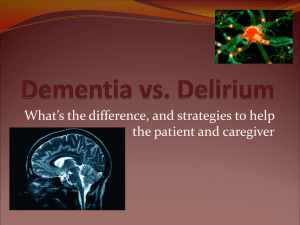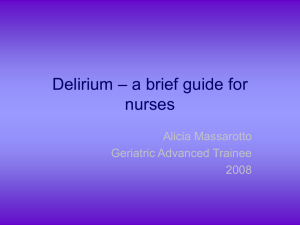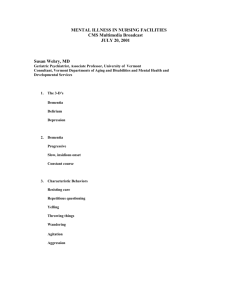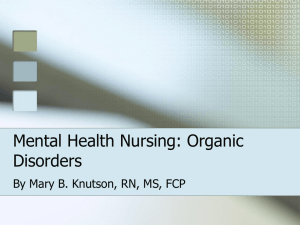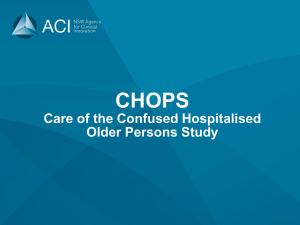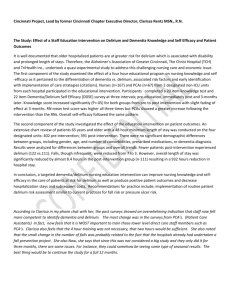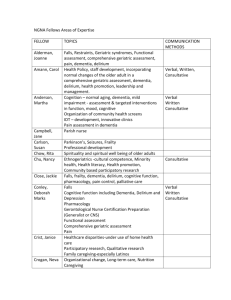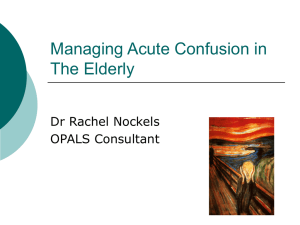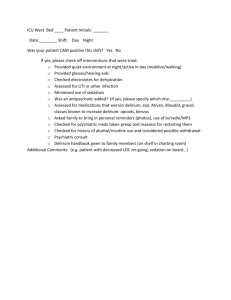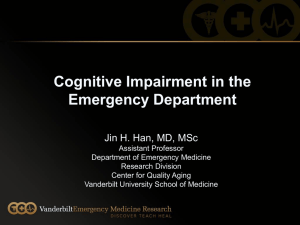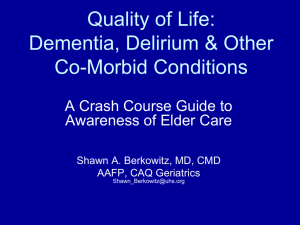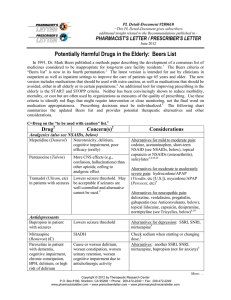Geriatrics - Modest Mango
advertisement
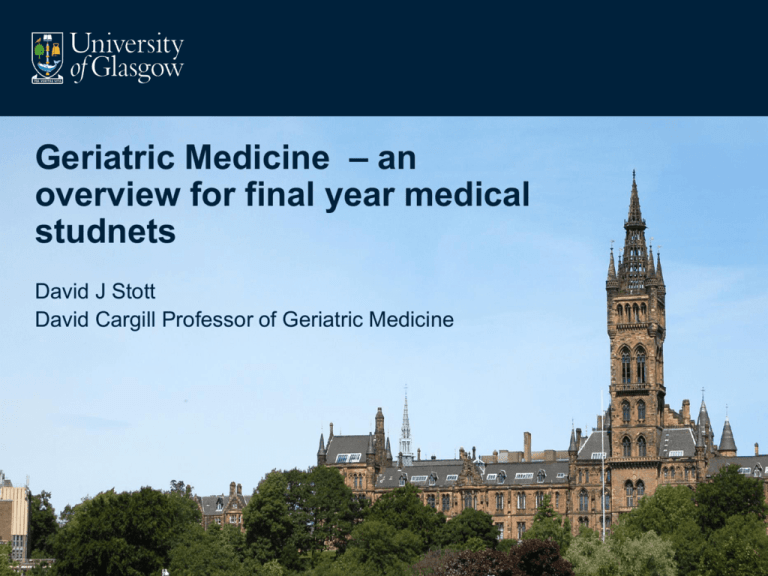
Geriatric Medicine – an overview for final year medical studnets David J Stott David Cargill Professor of Geriatric Medicine Aims and objectives • Knowledge – – – – Presentation of disease in later life Pragmatic approach to care Comprehensive Geriatric Assessment Rehabilitation • Skills – Diagnosis • Attitudes – Ethical approach – Positive / realistic attitude outcomes healthcare for older people Geriatric Giants – non-specific presentation of disease / frailty • • • • Instability (falls) Immobility (‘off feet’) Incontinence Intellectual impairment (delirium and dementia) Case presentation, 85yrs female • Cognitively slow – responds simple motor commands – 2/4 on AMT4 • Surrogate history (daughter) – 1 week deterioration mobility, assistance to transfer / walk, confusion – Fall out of bed – Urinary incontinence • PMH – MI, # femur, depression – Deaf, hearing aids – Short-sighted, glasses • Drugs – 10 on prescription • FH/SH – Lives alone, home help daily Observations / basic investigations • Thin • Temp 38.5oC • Lying / standing BP 112/70, 90/68 mmHg • Crackles R lung base • Na 118 mmol/L • Urea 15.2 mmol/L • WBC 24.9 109/L • CRP 250 Construct a problem list • Brainstorming – Long list • Organising – Key domains • Prioritising – What needs sorted first Key concepts in geriatric medicine • Non-specific presentation of disease • Frailty • Multiple diseases • Iatrogenesis – adverse drug reactions • Reduced homeostatic reserve • Multiple problems • Complex solutions Testing comprehension • Single stage motor commands – Show me your tongue • 2 or 3-stage motor commands – Take this paper in your left hand, fold it in half, and hand it back to me (put it on the floor/table) Causes of impairment • Reduced conscious level • Deafness • Depression • Dysphasia • Resistive / non-cooperative • Severe delirium / dementia • Motor deficit – (weakness, pain) Is this older person confused? Diagnosis Recognition Dementia Delirium Treatment Prevention 4-point Abbreviated Mental Test (AMT4) 1. 2. 3. 4. what year are we in? what do we call this place you are in? how old are you? what is your date of birth? Reasons older people score badly on formal cognitive testing • Cognitive impairment – Delirium, Dementia • • • • • • Deafness, visual impairment Motor deficit Dysphasia Reduced conscious level Resistiveness Distracted (pain, emotional distress, depression) Diagnostic criteria for dementia (DSM IV-R) • Impaired short and long-term memory • At least two of; impaired abstract thinking, poor judgement, dysphasia / dyspraxia / agnosia, personality change • Interferes with work or social activities • No delirium • Identified organic cause / no non-organic mental disorder Prevalence of dementia (%) by age (yrs) Mild cognitive impairment (MCI) and dementia, age > 65 MCI 16.8% Dementia 8.0% MCI + dementia 24.8% Graham, Lancet 1997;349:1793 Cognitive decline in older people – the interaction of Alzheimer pathology and vascular disease Neurofibrillary tangles Small vessel ischaemia - deep white matter Beta-amyloid Confusion assessment method (CAM) criteria for delirium 1. 2. 3. 4. Acute change in mental status Inattention (fluctuation) Disorganised thinking Altered level of consciousness Delirium requires 1 + 2 + (3 or 4) Cumulative incidence of delirium in hospitalised patients Age > 65 years 15-20% ‘Frail’ elderly 40-60% Prior chronic 30-45% cognitive impairment Cochrane Database of Systematic Reviews Outcome of delirium • • • • • Prolonged hospital stay Increased mortality Increased costs of health care Residual cognitive impairment Increased risk of progression to dementia Causes of delirium Disturbance Infection Cardio-respiratory Fluid / electrolyte Metabolic Intracranial Drug toxicity/withdrawal % of cases 35 32 30 13 12 20 O'Keefe & Lavan, Age Ageing 1999;28: 115 Basic protocols of care for frail older people reduce the risk of delirium • • • • • • Orientation / cognitive stimulation Non-pharmacological sleep protocol Early mobilisation Visual aids / adaptations Hearing aids etc Active rehydration Inouye NEJM 1999; 340: 669 Incidence of delirium Assessing mobility • History (patient / surrogate) – current and usual status – Bed / chair transfers, walking – Independent / personal assistance (eg 1 or 2 people) – Aids (Zimmer, stick etc) • Examination – Transfers (bed / chair, gait) • Timed up-and-go test – Usual walking aid History taking and falls risk assessment for older people • All older individuals should be asked whether they have fallen (in the past year) • An older person who reports a fall should be asked about the frequency and circumstances of the fall(s) • Older individuals should be asked if they experience difficulties with walking or balance • Contributory medicines A fall is a symptom not a diagnosis Common causes to consider • Postural hypotension • Paroxysmal cardiac arrhythmias • Epilepsy • Neurological disease – (eg stroke, Parkinson’s, cervical myelopathy) • Sarcopaenia – (eg undernutrition) • Poor judgement of capabilities – (eg dementia) Summary – history taking in older patient Things to do • Test comprehension / cognition – Simple motor commands – AMT4 – Surrogate history if problem • Identify geriatric giants • Determine mobility aids and needs for personal assistance • Recognise communication barriers – Sensory impairment • Hearing aid, Spectacles – Distracted patient • Pain, emotional distress • Recognise iatrogenesis • Patient / carer wishes / fears Things to avoid • Trying to take detailed history from patient with communication impairment • Planning care without taking into account patient and carer views Key concept - multidisciplinary care for the frail older person • Rehabilitation – – – – – – – – – – Assessment Nursing Medical treatment Goal-setting Physical therapy Aids and adaptations Education Psychological support Evaluation / follow-up Patient and carers Comprehensive geriatric assessment for older adults admitted to hospital • 22 trials, 6 countries, 10315 elderly participants • Patients given CGA were – More likely to end up alive and in their own homes (6 months OR 1.25, 95% CI 1.11 to 1.42, P = 0.0002) – Less likely to be institutionalised (OR 0.79, 95% CI 0.69 to 0.88, P < 0.0001) – More likely to have improved cognition (OR 1.11, 95% CI 0.20 to 2.01, P = 0.02). • Compared to general medical care Ellis CDSR 2011 The importance of the multi- or inter-disciplinary case conference • Key component of proven systems of CGA in hospital • Medical involvement • Minimum weekly face-face meetings Community-based multidisciplinary care • Randomised controlled trials of communitybased multifactorial interventions • 89 trials including 97984 elderly people • Reduced nursing home admissions RR=0·87 (95%CI 0·83,0·90) • Death RR=1·00 (95%CI 0·97,1·02) Beswick, Lancet 2008; 371: 725 Conclusion – comprehensive multidisciplinary assessment and rehabilitation for frail older people In hospital • Reduces disability • Reduces risk of cognitive decline • Increases chances of survival In community • Increases chances of independent living Thank-you for your attention!
